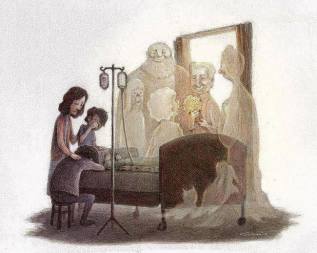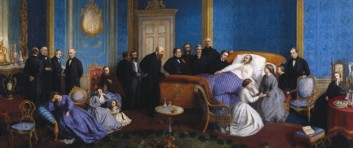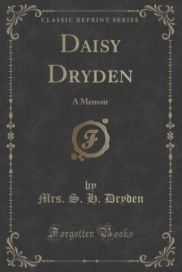
UNSEEN REUNIONS
heavenknowsbooks ♦ May 29, 2017 ♦ 2 Comments
“There is no river, there is no curtain, there is not even a line that separates this life from the other life. It is all here and it is there. I know it is so, for I can see you all, and I see them there at the same time.”
These words were spoken by ten year old Daisy Dryden in 1864 as she lay on her deathbed.
According to Callanan and Kelley in their wonderful book, ‘Final Gifts’, most hospice nurses know when death is imminent by the symbolic language, veiled predictions and unseen reunions that occur to many in the final stages of transition.
 ‘Unseen reunions’ can provide considerable comfort to loved ones by confirming that those who have ‘gone before’ are standing by to help the dying person make the transition and to welcome them into the afterlife.
‘Unseen reunions’ can provide considerable comfort to loved ones by confirming that those who have ‘gone before’ are standing by to help the dying person make the transition and to welcome them into the afterlife.
Sadly, nurses are often the only witnesses to this phenomena. Throughout the latter part of the twentieth century, visitors were invariably ushered out of hospital rooms when death neared, as doctors feared that being present at the moment of death would be too traumatic.
 In previous centuries, however, family members would gather around their loved one’s deathbed, and often, one member of the group would keep a record of every word uttered by the dying person.
In previous centuries, however, family members would gather around their loved one’s deathbed, and often, one member of the group would keep a record of every word uttered by the dying person.
 Daisy Dryden’s account is perhaps one of the most poignant accounts of such ‘unseen reunions’. It was recorded by her mother and was published in 1894 by Boston Colonial Press.
Daisy Dryden’s account is perhaps one of the most poignant accounts of such ‘unseen reunions’. It was recorded by her mother and was published in 1894 by Boston Colonial Press.
Daisy was born in California in 1854 ,and in 1864 she contracted typhoid fever. She fought courageously for five weeks, but during her final three days she was unable to retain food, water or medicine.
“Her mind was very active and remarkably clear,” Mrs. Dryden wrote, adding that “although emaciated to the last degree, her voice was remarkably strong and her enunciation clear, and she recognized every individual who came, and spoke to them, and answered their questions intelligently.”
Daisy’s six-year old brother Allie had died of scarlet fever just seven months earlier, and throughout her final days she conducted a regular dialogue with him.
When asked questions she could not answer, Daisy would say: “Wait till Allie comes, and I will ask him.” Her mother wondered how she could be conversing with her brother when she showed no signs of conversation, but Daisy replied with a smile: “We just talk with our think.”
On one occasion, her mother asked if it would be possible for Daisy to visit after she crossed over, and she replied: “Allie says I may go to you sometimes. He says it is possible, but you will not know when I am there.”
Then she added: “But I can speak to your thought.”
Mrs. Dryden wrote that Daisy had been a good child, possessing ordinary good sense, but that “in no way was she more remarkable than many other children” adding that “her dying experience, therefore, was not the outgrowth of a life highly spiritual, nor was it one which had been educated in the least degree on the lines of mysticism or modern spiritualism.”
Indeed, Mrs Dryden asserted that Daisy did not see spirits with her natural eyes, but confirmed that for the last three days of her life, she held regular communion with departed ones.
When the Sunday School Superintendent visited, he tried to comfort her by saying that soon she would be “over the dark river.” When he left, she asked what he meant by the ‘dark river’, and her father tried to explain. “It is all a mistake,” she said. “There is no river, there is no curtain, there is not even a line that separates this life from the other life. It is all here and it is there. I know it is so, for I can see you all, and I see them there at the same time.”
When asked to describe how that other world looked, she simply replied: “it is so different, I could not make you understand.”
Daisy’s sister, Lulu, often sang to her during her final days, and on one occasion her song was about angels with snowy wings. When she finished, Daisy exclaimed “Oh Lulu, is it not strange? We always thought the angels had wings! But it is a mistake, they don’t have any.” When Lulu remarked that they must have wings, else how could they fly down from heaven, Daisy replied “Oh but they don’t fly, they just come. When I think of Allie, he is here.”
When asked how she saw the angels, Daisy explained “I do not see them all the time, but when I do, the walls seem to go away and I can see ever so far and you couldn’t begin to count the people; some are near, and I know them; others I have never seen before.”
Friends and neighbours came to visit in the last few days of her physical life, and Daisy was able to provide comfort for them by relating messages from their deceased loved ones who had also gathered around.
“Dear Mamma,” she said at one time, “I do wish you could see Allie, he is standing beside you.” Involuntarily, her mother looked around, but Daisy continued: “He says you cannot see him because your spirit-eyes are closed, but that I can, because my body only holds my spirit … by a thread of life.”
She described her brother as having about him “a white, beautiful something, so fine and thin and glistening, and oh, so white, and yet there is not a fold, or a sign of thread in it, so it cannot be cloth. But it makes him look so lovely.” Her father offered the quote “he is clothed with light as a garment” to which Daisy quickly responded “Oh yes, that’s it!”
A few hours before she died, Daisy said “this body of mine is about worn out. It is like that old dress of Mamma’s hanging there in the closet. She doesn’t wear it any more, and I won’t wear my body any more, because I have a new spiritual body which will take its place … you will lay my body in the grave because I will not need it again. It was made for my life here.”
Then she added: “Before another morning I shall be gone.”
At eight-thirty that evening, Daisy revealed that Allie would come for her at half-past eleven. She then rested her head on her father’s shoulder and said “Papa, I want to die here. When the time comes, I will tell you.”
“Just as the hands of the clock pointed to the half-hour past eleven,” Mrs Dryden later wrote, “she lifted both arms and said: ‘Come, Allie’ and breathed no more.”
“There was a solemn stillness in the room.” Mrs. Dryden recalled. “We could not weep, and why should we? And as we stood there gazing on the face of the dear one, we felt that the room must be full of angels come to comfort us, for a sweet peace fell upon our spirits.”

- Posted in: afterlife
- Tagged: deathbed visions daisy dryden death dying heaven visitors afterlife
2 Comments
Leave a comment Cancel reply
This site uses Akismet to reduce spam. Learn how your comment data is processed.

Thank-you. Wonderful account. God Bless
LikeLike
I like to believe
LikeLike